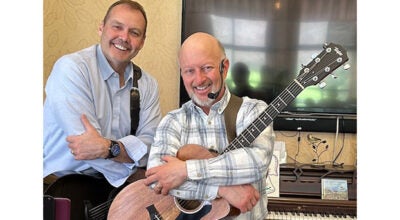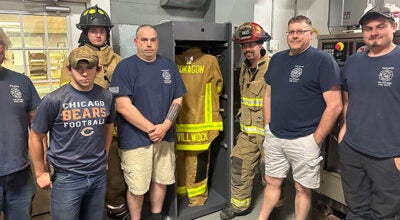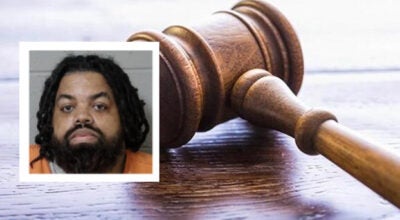Pokagon Band Indiana office open
Published 8:12 pm Wednesday, June 5, 2013
SOUTH BEND, Ind. — Whether it’s called a partnership (South Bend Mayor Pete Buttigieg) or a relationship (Pokagon Band of Potawatomi Chairman Matt Wesaw), it’s authentic and features frequent communication.
“We make certain to not surprise one another and include one another in our vision, values and plans,” Buttigieg said Wednesday at the dedication of the Dowagiac-based tribe’s Indiana office at 3733 Locust Road on the southwest side of South Bend.
The Pokagon Band will use a renovated 1920s residence as a government facility and satellite to its main administrative office in Dowagiac, providing services to hundreds of citizens in six Indiana counties.
“One of the things that makes South Bend extraordinary is the many layers of diversity which give our community richness and strength and, frankly, make us a little more interesting,” the mayor said. “There’s no question that a very meaningful element in what makes our city what it is is the heritage of the first Americans here.”
“My own father only came to this country in the 1970s,” Buttigieg said. “My mother’s family came here generations ago looking for a better life. My own maternal great-grandfather we believe to have been half Choctaw Indian on the Plains. These layers only add to the depth and meaning of what it means to be American. It’s possible to be fully part of both worlds. There may have been a time in the life of our nation the American Indian was left without support. Now, I like to believe the reverse is the case. A member of the Pokagon Band in our community is twice blessed. Once, by services and benefits of the leadership of tribal council, but also fully a member in citizenship and somebody the City of South Bend is concerned and eager to help support and develop. Just since I’ve come into office, the Pokagon Band has supported river otters at the Potawatomi Zoo, the LPGA Symetra Tour Four Winds Invitational benefiting Memorial Children’s Hospital and public radio and television across our region.”
“To be honest,” Wesaw said, “we don’t use ‘partnership,’ we use ‘relationship,’ which has a more family feel and a little bit more trust. We really appreciate what’s developed so far.”
South Bend Common Council attorney Kathy Cekanski-Farrand presented a proclamation to “publicly commend, honor and congratulate the Pokagon Band and welcome you again to our great city as we celebrate together the official opening of your office. The Pokagons have always lived here and will always live here. Our community becomes even more enriched as a destination by your rich cultural heritage. May we continue to build friendships.”
Wesaw welcomed “fellow government partners,” including Indiana state Rep. David Niezgodski, St. Joseph County Commissioners Dave Thomas and Diana Hess and South Bend Common Council President Derek Dieter.
“With reaffirmation of the Pokagon Band’s sovereignty in 1994, signed by President Clinton,” Wesaw said, “tribal council has been working on community development initiatives for our citizens who live in both Michigan and Indiana. This is tangible evidence of our mission to establish self-sufficiency by assisting elders, youth and families with health, education, housing, financial and social service programs that will provide a better quality of life.”
Tom Topash of tribal council reflected on Leopold Pokagon.
“His goal was to have us remain in our gorgeous homeland. Further, he wanted to see we would have economic development to keep us on a level playing field. Here we are today, a full expression of that thought.”
Butch Starrett of tribal council said, “We’re not here to be forgotten or not be a part of the community. We’re here to partner with community leaders to develop a strong South Bend community.”
Treasurer John Warren lives in Granger, but grew up in South Bend, so “it always has a place in my heart. My son, who was just up here singing, is with a drum group called Ribbontown, which is what Potawatomis always called South Bend. As settlers moved in, like Navarre and Coquillard, or Bertrand up in Niles, we traded furs for goods. Ribbon was prized.”
At a meeting in Dowagiac earlier Wednesday, Wesaw said Dr. David Mathews, Southwestern Michigan College president, gave him a 1969 newspaper clipping about tribal council meeting at the Armory. “My uncle, from Chicago, happened to be on the council at that time. He walked on many years ago, but it was nice to remember him as a young man back then.”
Asked about the April 30 opening of Four Winds Dowagiac, Wesaw said, “It’s doing very well, but too early to tell because a lot of people come to check it out. We need maybe two months to determine, but we expect our brand to do well on a smaller scale. We’ve been fortunate with people we hired to do our projections, which have been on the money. We’re very proud of” the M-51 South casino.
Five veterans advanced the colors. “Veterans, our true warriors who never fail to answer the call, are highly respected in our culture,” Wesaw said. “Per-capita, more native individuals serve in the military than any other race in this country.”
Vietnam Army veteran Jerry Campbell of Elkhart, who carried Indiana’s flag, said, “The first time I felt honored outside my immediate family was by my Indian tribe, which gave me a lot of peace. (How veterans are treated) has been turned around (in subsequent conflicts), for which I’m happy. People send them things and acknowledge them.” From a family of 13 children, “Three of us boys went to Vietnam.”
Anthony Foerster of Three Oaks toted the eagle staff, on which each feather represents a family. The Marine served in Panama in 1989.






